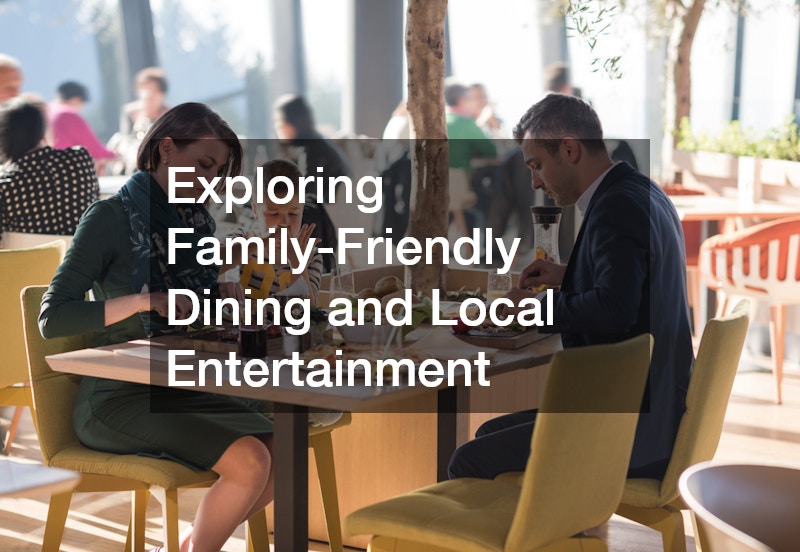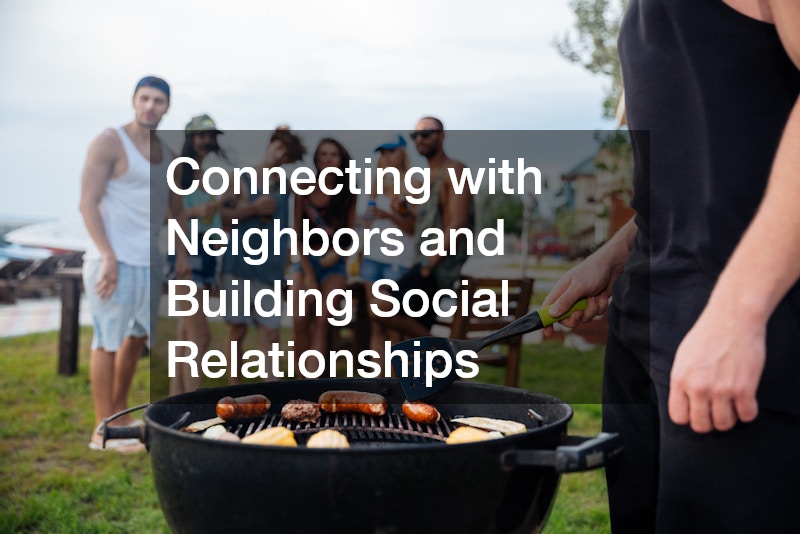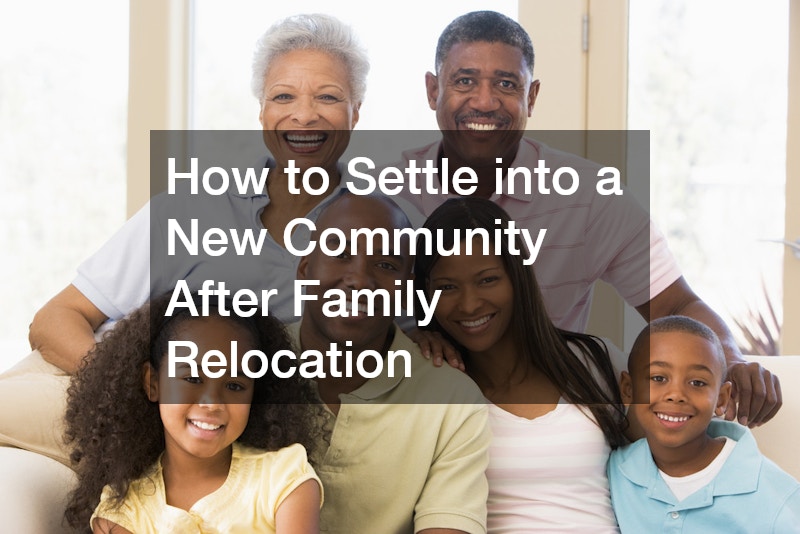
Relocating to a new home is an exciting yet challenging experience, especially for families. The process involves more than just unpacking boxes and adjusting to new surroundings. It’s about creating new routines, establishing connections, and making your family feel at home in an unfamiliar environment. Whether you’re moving across the country or just a few blocks away, the transition can feel overwhelming. However, with a little effort and a positive mindset, settling into your new community can become an exciting adventure for the whole family.
For a family relocation, the key to a smooth transition is to focus on the things that matter most—finding local services, engaging in family-friendly activities, and building a sense of community. First, ensure that you find essential services like family chiropractic services, family dentistry, and local eye doctors. These providers will be crucial in maintaining your family’s well-being in your new environment. In addition to healthcare, discovering local resources such as family restaurants, pools, fitness clubs, and other recreational spots will help ease the adjustment.
1. Finding Local Health Services and Building a Support Network
One of the most important steps after a family relocation is to find reliable healthcare providers in your new community. Establishing relationships with local services, such as family chiropractic services, family dentistry, and local eye doctors, will provide your family with the support you need to stay healthy and comfortable.
Family chiropractic services are especially beneficial when moving, as the physical stress of packing, lifting, and adjusting to new routines can lead to discomfort or even injury. A local chiropractor can help you and your family manage any pain or stiffness, ensuring that everyone remains active and healthy during the transition. Whether you’re experiencing back pain from moving furniture or just need an overall adjustment, finding a chiropractor that specializes in family care is essential.
Similarly, it’s important to find a trusted family dentist in your new area. Maintaining oral health is just as important as overall well-being. A local family dentist can provide regular checkups, cleanings, and emergency care if necessary. When your children feel comfortable with their new dentist, they’ll be less likely to experience anxiety around appointments. Additionally, local eye doctors are key to ensuring everyone’s vision needs are met, especially if someone requires corrective lenses or has specific eye concerns.
Building a support network is also essential during the transition. These healthcare providers often become familiar faces that you and your family can rely on, providing both comfort and a sense of stability. If you need recommendations for other services like pediatricians or nutritionists, your new doctor’s office can often direct you to reliable professionals.
By finding these essential services, you can rest assured that your family’s health needs are taken care of, which helps alleviate stress during the settling-in period.
2. Exploring Family-Friendly Dining and Local Entertainment

Once the basics of health and wellness are taken care of, the next step in settling into a new community is to explore family-friendly dining options and entertainment. Discovering local family restaurants and entertainment venues will help your family build positive associations with your new neighborhood.
Family restaurants are ideal places to unwind and relax after a long day of unpacking or exploring your new community. Many family-friendly eateries offer kid-friendly menus, ample seating, and an atmosphere conducive to both casual dining and socializing. By visiting different family restaurants, you not only get a taste of local cuisine but also become familiar with the dining culture in your new area. It’s a great way to try new dishes, support local businesses, and establish a routine for family meals outside of the home.
Additionally, local entertainment options such as fitness clubs, pools, and recreational centers provide opportunities for both adults and children to stay active and engaged. Fitness clubs in the area might offer family memberships, allowing everyone to participate in group fitness classes, swim, or enjoy other activities together. Pools are an excellent way to cool off during the summer, and many community pools host family swim sessions, making it easy to bond while staying fit.
For children, finding activities such as a karate class for kids can be both fun and beneficial. Karate classes teach children discipline, respect, and self-defense, all while helping them stay physically active. By enrolling your children in such programs, you can also meet other families and start to build connections with people in your new neighborhood.
Exploring these family-friendly options helps ease the transition by creating new routines that everyone can look forward to. It’s important to have these enjoyable outlets to balance out the stresses of moving and adjusting to a new home.
3. Establishing a Routine and Creating Stability
When relocating to a new community, establishing a consistent routine is essential for both parents and children. Routine provides structure, helping your family adjust to their new surroundings while creating a sense of normalcy amidst the changes.
Start by incorporating key local services into your family’s routine. Regular visits to local family chiropractic services and the family dentist will become part of your regular schedule. Scheduling check-ups early on ensures that your family stays on top of their health, reducing any stress associated with moving. Additionally, establishing a routine around activities like swimming at the local pool or attending fitness classes at a local gym can help everyone stay active and engaged.
For children, a well-established routine is crucial for their emotional and psychological adjustment. Make sure to establish a consistent bedtime, mealtime, and after-school schedule. In addition to physical routines, create time for educational or fun activities, such as visiting local libraries, attending community events, or taking part in a karate class for kids. These activities give your children something to look forward to, allowing them to socialize and adjust to their new environment.
Don’t forget about the importance of personal time. Parents should find time to relax, whether it’s taking a walk around the neighborhood, reading at a local café, or attending a fitness class. By maintaining a balanced routine, everyone can adapt more quickly to the changes in their lives.
Routines also provide a sense of control. As you continue to explore local services, activities, and places, it will become easier to establish a rhythm that works for your family. This stability will make the new community feel more like home and reduce the anxiety that often accompanies a family relocation.
4. Connecting with Neighbors and Building Social Relationships

Building a social network in your new community is an important part of feeling at home after a family relocation. One of the first steps in connecting with others is introducing yourself to your new neighbors. A simple hello and introduction can go a long way in making your family feel welcome and starting to build relationships in your new area.
Attending local events such as block parties, neighborhood picnics, or holiday gatherings is a great way to meet other families in your community. These social events are designed to bring neighbors together in a relaxed, fun environment. They allow you to connect with others who may be going through similar experiences or who can offer recommendations about local services.
Volunteering for local causes is another great way to build relationships and integrate into your new community. Many areas host volunteer opportunities, whether it’s organizing a charity event, cleaning up a park, or helping out at a local food bank. Volunteering is not only a way to give back to your new community but also to meet like-minded people who share your interests and values.
For children, participating in extracurricular activities like a karate class for kids or joining a local sports team can be a way for them to meet other children their age and form lasting friendships. Parents often form their own social networks through these activities, which can make it easier to adjust to your new home.
By actively engaging with your neighbors and the broader community, you’ll establish the social connections needed to make your family feel more settled. These relationships will become a valuable source of support and will help your family feel more integrated into your new area.
5. Finding Local Schools and Educational Resources
For families with children, one of the most important aspects of settling into a new community is finding the right educational options. Whether it’s enrolling your children in public or private schools, the quality of education plays a key role in your family’s transition.
Start by researching local schools and meeting with administrators or teachers to get a feel for the educational environment. Many schools offer open houses, tours, or parent-teacher meetings that allow you to learn more about their curriculum and after-school programs. By getting involved in your children’s education early on, you help them feel more comfortable and confident as they adjust to their new school.
If your child has specific needs, such as special education services or a preference for extracurricular activities, make sure to ask about these options when visiting schools. Additionally, many communities offer specialized programs like language immersion, arts, or STEM-focused curricula that may be a perfect fit for your child’s interests.
In addition to traditional education, consider local educational resources such as libraries, tutoring centers, and community centers. These resources offer a variety of programs designed to support your child’s academic growth. Some libraries offer free classes or reading programs, while tutoring centers can provide additional support for students who need extra help with their studies.
Finding the right educational fit for your child ensures that they feel secure and supported during this transitional period. Whether it’s public or private schooling, enrichment activities, or after-school clubs, the educational opportunities available will help your child settle into their new life.
6. Engaging in Outdoor Activities and Recreation
Exploring the outdoors and engaging in recreational activities is a great way to help your family adjust to their new community after a relocation. Many communities offer parks, hiking trails, and recreational areas where families can enjoy quality time together while staying active.
Local parks provide a space for children to run, play, and meet other kids, while also offering parents a chance to relax. Many parks have playgrounds, picnic areas, and walking trails that can be enjoyed year-round. Visiting these parks regularly allows your family to familiarize itself with the surroundings and enjoy the outdoors in a relaxed setting.
In addition to parks, many communities have recreational centers or sports leagues where families can participate in organized activities. Whether it’s joining a local soccer league, attending a swim meet at the community pool, or enjoying a round of at a local golf course, outdoor activities provide an excellent opportunity for both physical exercise and family bonding.
Exploring these outdoor activities also helps your family integrate into the community. You’ll meet others who share your interests and can learn more about local events and activities. By spending time outside, your family will not only stay active but also develop a deeper connection to the area.
7. Shopping Locally and Supporting Small Businesses

One of the simplest and most rewarding ways to settle into your new community is by shopping locally and supporting small businesses. Whether you’re picking up groceries, purchasing baseball equipment for your kids, or searching for household items, supporting local stores not only benefits the economy but also fosters a sense of community.
Local farmers markets are a great place to start. These markets offer fresh produce, artisan goods, and unique local items that big-box stores simply can’t provide. Shopping at these markets gives you the chance to connect with the people who produce your food and other essentials. It also supports small businesses, helping to strengthen the local economy.
If you’re looking for sporting goods or outdoor gear, many communities have local stores that specialize in equipment like baseball bats, gloves, and soccer balls. These stores often offer personalized customer service and expert advice, which makes finding the right gear for your family easier.
By supporting small businesses, you’ll be helping to build stronger connections with your new community. You’ll also get to know the local landscape better and make your family feel more integrated into the area.
8. Making Your Home Feel Like Home
One of the most important aspects of settling into a new community is transforming your house into a home. Personalizing your new space will help create a sense of comfort and security for your family. The sooner you unpack and set up, the sooner everyone will feel settled and at ease.
Start by arranging your furniture in a way that suits your family’s lifestyle and needs. Create cozy spaces for reading, playing, and relaxing. Consider adding personal touches like family photos, artwork from local artists, and keepsakes that remind your family of the places and people you’ve loved before.
Exploring your new neighborhood is another way to make your home feel familiar. Take walks, visit local parks, and spend time discovering nearby shops and attractions. This helps your family feel more connected to the area and allows you to get comfortable with your surroundings.
By focusing on making your house a true home, you’ll create a space where everyone can feel safe, comfortable, and relaxed.
9. Staying Active and Engaged in the Community

Staying active and engaged in the community is vital to making your family feel at home. Involvement in community activities helps everyone feel like they belong and creates lasting memories. Consider volunteering at local events, joining community organizations, or simply attending neighborhood gatherings.
Volunteering is an excellent way to give back while meeting new people. Many communities host charity events, clean-up projects, or fundraising initiatives that benefit local causes. Volunteering gives your family a sense of purpose and allows you to connect with others who share your values.
Settling into a new community after a family relocation can be a rewarding and fulfilling experience. By focusing on practical steps like finding local health services, exploring family-friendly dining and entertainment options, and building relationships with neighbors, your family will be able to adjust and thrive in the new environment.
Whether it’s through engaging in recreational activities, shopping locally, or getting involved in your neighborhood, the process of settling in will help you and your family create lasting connections and a strong sense of belonging.
By staying proactive and open to new experiences, you will transform your new community into a place that feels like home. It may take time, but each small step you take will bring you closer to embracing this new chapter of your life.



